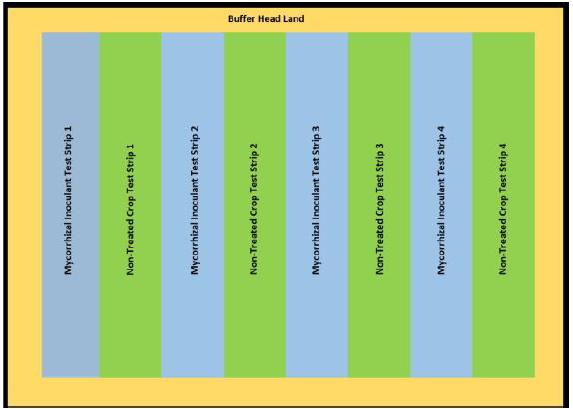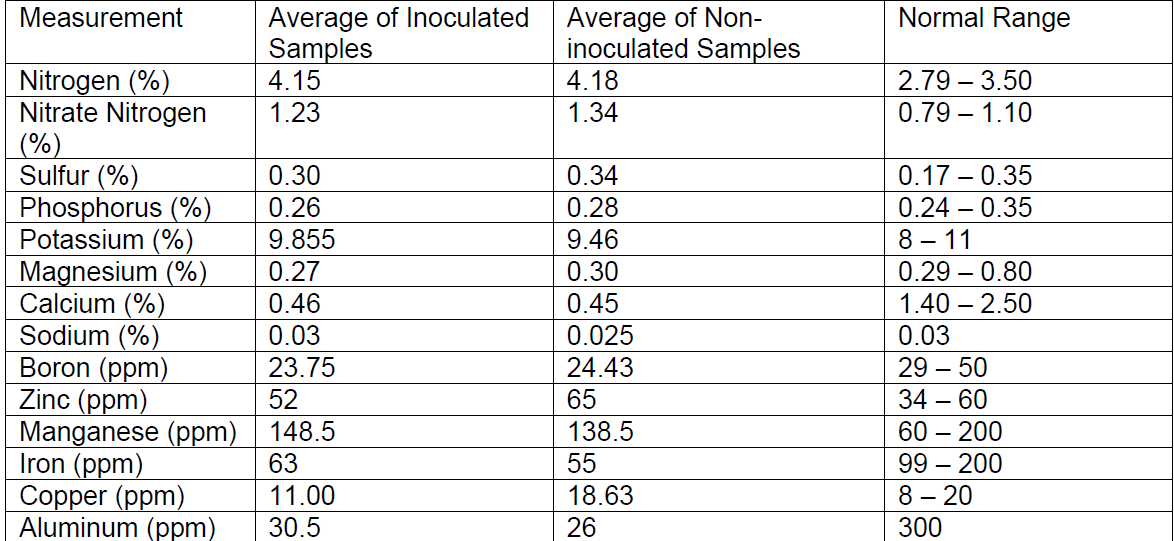Purpose
This project is testing the effects of AGTIV mycorrhizal inoculant on potato crops. The inoculant is intended to improve plant growth, health, and increase overall yield and quality of the crop. With the added fungi in the soil, the mycorrhizal inoculant is also supposed to improve soil health and structure. This trial is testing the effectiveness of the inoculant on improving crop production and soil health, with the goal of determining whether the inoculant could improve the quality and yields of crops grown in northern Ontario, therefore benefiting farmers with increased profits from these crops. Long-term benefits could also be provided from improved soil quality, resulting in higher-quality crops in the future.
Background
The Northeastern Ontario Soil and Crop Improvement Association, in partnership with the West Nipissing/East Sudbury and West Sudbury SCIAs and the Northern Ontario Farm Innovation Alliance, conducted a three-year study to test the effects of Premier Tech’s AGTIV mycorrhizal inoculant on potato, soybeans, and oats between 2018 and 2020. This current project builds on the findings of that project and will run from 2021 to 2023.
Mycorrhizae are a type of fungi that are found naturally in soils and form mutually beneficial networks with the roots of plants. These networks allow plant roots to reach and uptake minerals, nutrients, and water. As the fungal network expands, the plant has access to minerals, nutrients and water that, through its roots alone, it would not be able to reach. This relationship between plant and fungi stimulates root development and overall plant growth, resulting in healthier and more vigorous plants and therefore greater production and disease resistance. In addition to plant health, mycorrhizae improve soil structure, increase organic matter, and play a positive role in soil aggregation. Soil disturbances, especially frequent deep tilling, break up these fungal networks and reduce their positive effects.
Many trials studying the use of mycorrhizal inoculants on different crops have shown improvements in plant health and yields. Therefore, there is a strong possibility that this product would be a viable option for northern Ontario potato farmers to help improve crop production.
Premier Tech offers the AGTIV line of biologically active treatments, which, through an inoculant applied at the time of planting, is intended to repopulate and re-establish mycorrhizal networks. The AGTIV line includes treatments optimized for different crops.
This product line is of interest to farmers in the north, and as such, was selected as the mycorrhizal inoculant product to be used over the course of this project.
Methods
Premier Tech’s AGTIV Potato Liquid mycorrhizal inoculant will be tested annually on potato crops in the Sudbury region. In 2021, the inoculant was tested on two fields at one location.
Within each field strips of inoculated and non-inoculated potatoes were alternated. The size and spacing of these strips were determined by each farmer’s equipment, but each plot had at least four strips of both inoculated and non-inoculated crops. In addition to the mycorrhizal inoculant, the crops also received standard fertilizer and pesticide treatments.
During the growth stage of the trials, tissue samples for both inoculated and non-inoculated crops were gathered and analyzed for comparison. Upon harvest, differences in yields between inoculated and non-inoculated strips were recorded to gauge the effect of the inoculant on crop productivity. All soil and tissue sample analyses were conducted by A&L Canada Laboratories in London, Ontario
Figure 1: Trial plot set-up. At least four reps of inoculated and non-inoculated strips were planted at each plot site over a 5-acre area.

2021 Potato Yields
In 2021, yield measurements were conducted just prior to harvest at the trial site. The field was subdivided into four equal sections perpendicular to the length of the alternating inoculated and non-inoculated strips of potatoes. Within these divisions samples of both inoculated and non-inoculated strips were gathered by digging up 1 metre lengths of the potato row, weighing the resulting potatoes, and returning them to the soil for harvest a day or two later. In this way, 72 samples of inoculated potato strips and 72 samples of non-inoculated potatoes were measured, representing samples evenly distributed across the entire field.
The inoculated samples ranged in weight from 3.1 kg/m to 8.6 kg/m, and had an overall average weight of 5.665 kg/m. The non-inoculated samples ranged in weight from 3.4 kg/m to 8.0 kg/m and had an overall average weight of 5.311 kg/m. The inoculated potatoes had an average increased yield of 0.354 kg/m over the non-inoculated potatoes. This represents an increase of 6.67%.
Potato tissue samples were gathered 70 days after emergence in July 2021. Samples were collected from the fourth petiole from the top of the potato plants.
Table 1. 2021 Potatoes Tissue Analysis – Sudbury Site

The inoculated potato tissue samples had higher concentrations of potassium, calcium, sodium, manganese, iron, and aluminum. Non-inoculated samples had higher concentrations of nitrogen, sulphur, nitrate nitrogen, phosphorus, magnesium, boron, zinc, and copper.
Economic Analysis
Table 2. A Comparison of Increased Income and Cost of Inoculant Application

The AGTIV potato liquid inoculant product costs $550 for a 950ml bottle, which covers 10 acres. This results in an approximate application cost of $55 per acre. Potatoes are priced per hundredweight (cwt), or 100lbs. OMAFRA lists the 2018 (the latest year of data available) average potato yield to be 205 cwt per acre. At a price of $25.25 per cwt (approximate price of January 2021) average income for an acre of potatoes would be $5176.25.
In 2021, the inoculated potatoes had a yield that was 6.67% higher than the non-inoculated potatoes. Applying that 6.67% yield increase measurement to the average income per acre of potatoes of $5176.25 would increase the income to $5521.50/acre, suggesting that inoculation results in an increase in income of approximately $345.25 per acre. Given the $55 per acre application cost of the inoculant, 6.67% yield increase measurement would result in a net increase in income of $290.25 per acre.
This economic analysis takes onto account only the application cost of the inoculant and the correlated increased yield. It does not account for other potentially positive outcomes from the inoculant, such as more disease resistant plants and better uptake of soil nutrients. For example, it would also not take into account the potential saved cost of additional spraying for a deficiency that these crops did not have because they received the inoculant.
Summary & Next Steps
The first year of this trial yielded promising results that suggested the mycorrhizal inoculant increased yield enough not just to cover the cost of application, but also to significantly increase the income from potatoes per acre.
Interestingly, the tissue sample results were more mixed. The mycorrhizal inoculant theoretically interacts with the roots of plants and gives them access to more nutrients, minerals and water than they otherwise would reach. If this is the case, then the potatoes treated with the inoculant would be expected to have higher, or at least comparable mineral and nutrient levels compared to the non-inoculated potatoes in the same fields. Tissue samples from 2021 showed that the inoculated potatoes often had slightly lower levels of nutrients and minerals than did the non-inoculated potatoes, including lower levels of nitrogen and sulphur. Despite this, the yield increase was still present in the inoculated potatoes.
This trial will continue for the 2022 and 2023 growing seasons, at which time a full report of the findings will be published.
Questions to Support Return on Investment Research
- Describe in words the primary benefits that were realized as a result of the research project. Consider economic, production, social, and environmental benefits.
- Then most notable benefit to come from the project thus far are the preliminary findings suggesting that AGTIV Mycorrhizal inoculant could significantly increase production and consequent economic income for potato farmers. Environmentally, this project has the potential to reduce fertilizer and pesticide applications. As the inoculant improves the ability of a plant to access nutrients in the ground, the need for applications of commercial fertilizers may decrease, consequently reducing the environmental risks of runoff and loss. The improved access to nutrients also improves the overall health of the plant, making it more able to withstand pest pressures, potentially reducing the need for commercial pesticide applications.
- For each of the benefits identified in response to the above question, please indicate who the research project benefitted (i.e. the host farmer, regional association, supporting agri-business, Ministry, etc.). How frequently might each group apply the research findings to their own operation?
- Beyond those farmers who would benefit from the findings of the project, the project directly benefits businesses and organizations who play a role in it. This includes the participating farmers who, in addition to receiving the AGTIV inoculant (and the resulting yield increases) free of charge, also receive a stipend for their assistance in the project. Premier Tech, NEOSCIA, NOFIA, and A&L Labs also benefit from the project. The AGTIV product used in the project was purchased from Premier Tech, and if the results end up being positive, the project could be used to market the product. NEOSCIA and the constituent member associations benefit by being able to use this project, and the offer of participation in similar future projects, to attract new members and retain existing members. NOFIA benefits from this project by fulfilling its overall mandate of performing research that benefits farmers and can cite the project as an example of effective research in northern Ontario to potential funding partners when applying for further research projects. Finally, A&L Labs also benefits from this project by being paid to analyze tissue and soil samples.
- What geographic area benefits most from the research findings?
- The research is being conducted in the Sudbury area, but theoretically the findings would be applicable to any location where farms use frequent tilling and break up naturally occurring arbuscular mycorrhizal networks. Indeed, the product may be more effective in locations where conventional farming has occurred for a longer period of time. The fields where this product is being trialled have been farmed for perhaps 80 years, and possibly considerably less. Whereas in many parts of Ontario intensive farming, including deep tilling, has been occurring for much longer, potentially further reducing arbuscular mycorrhizal fungi populations in the soil and increasing the value of the mycorrhizal inoculant. Currently in Northern Ontario, Thunder Bay and Sudbury districts are large potato-producing areas, and the Temiskaming district is growing in potato production as well. This research could have significant impact in expanding potato production in these regions.
- Please provide the results of any surveys conducted that could provide further insight on the positive impact of the research to the agricultural industry.
- No surveys have been conducted yet.
Acknowledgements
References:
Hijri, M. 2016. Analysis of a large dataset of mycorrhiza inoculation field trials on potato shows highly significant increases in yield. Mycorrhiza 26, 209–214 (2016). https://doi.org/10.1007/s00572-015-0661-4
Douds Jr., D.D., Nagahashi, G., Reider, C., and Hepperly, P.R. 2007. Inoculation with Arbuscular Mycorrhizal Fungi Increases the Yield of Potatoes in a High P Soil, Biological Agriculture & Horticulture, 25:1, 67-78, DOI: 10.1080/01448765.2007.10823209
Project Contacts:
Emily Seed, Executive Director, NOFIA, emily.nofia@gmail.com
Alex McRae, President, Northeastern Ontario SCIA, gawasfarm@gmail.com
